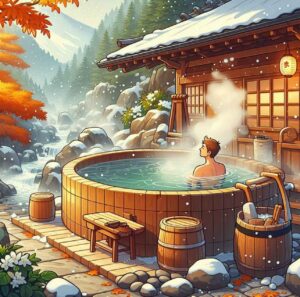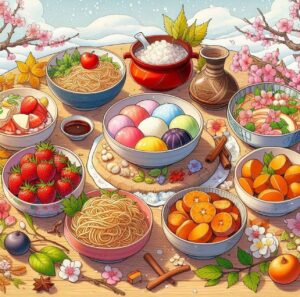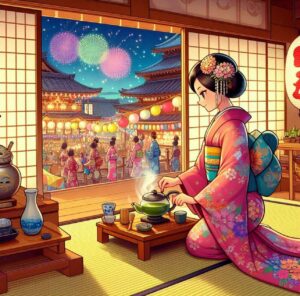Welcome Blessings!
(Tap 🔽 to see more topics!)


Living in Japan… it’s like stepping into a perfectly choreographed dance, where everything has its place and time. Have you seen those travel videos? Where the trains are amazingly punctual, and the streets are so clean, you wonder if they secretly employ tiny robot cleaners? That’s Japan, which makes people fall head over heels. But, let’s be honest, everyone’s got rhythm. Some people find that dance super smooth, while others feel tripping over their feet. You hear folks saying, ‘It’s just too quiet for me,’ or ‘I felt like I was living in a bubble, disconnected.’
Japan has a strong personality, like that friend who’s always got life together. They love structure, respect, and doing things just so. If you’re someone who thrives on order, loves digging into rich history, and appreciates a bit of calm, you might find your happy place there. But if you’re more of a ‘let’s see where the day takes us’ kind of person, or you need a bit of that familiar, comfortable chaos, you might need some time to adjust. It’s like finding out your favorite pizza toppings aren’t everyone’s favorite… it’s all about personal taste.
In today’s article, you will learn the ten everyday aspects of living in Japan that make some people say, ‘This is it!’ and why others might have a bit of a, shall we say, ‘culture shock’ moment.
Japan has this way of feeling…calm. You know that deep breath you take after a long day? That’s kind of the vibe. Even in places like Tokyo, which is huge, there’s this underlying sense of order, a quiet hum. It’s not that people are sad or anything. It’s more like everyone’s just…respectful.

If you get stressed out by noise and chaos, this will feel like heaven. Imagine a city where you can hear yourself think! It’s super relaxing for many folks.
But, and this is a big but, if you’re used to a place where people are more, well, loud, it can feel a little strange. Like, maybe too quiet? If you’re someone who expresses themselves with big gestures and a lot of talking, you might feel like you’re walking on eggshells. It can even feel lonely, like you’re missing out on something, mainly if you’re used to more open, boisterous interactions. It’s not that people are unfriendly; it’s just that they show respect and consideration in a very different way.
Public transport? It’s like, next-level organized. You’ve probably heard people rave about it, and for good reason.
Now, if you love things running smoothly, this is your dream. No more stressing about being late or dealing with dirty buses. Your daily commute? It’s a relaxing experience.
But, and there’s always a but, if you’re the kind of person who likes to, you know, “go with the flow,” this might feel a bit tight. You can’t decide to detour or linger somewhere without checking a timetable. The whole system is built on schedules, and that can feel a bit…rigid. Like, if you miss that train, you miss that train. There’s not a lot of wiggle room. So, while some people love efficiency, others might miss the freedom to wing it.
Japan lives and breathes the seasons. You’ll notice it right away, especially with the food. It’s like the whole country hits ‘refresh’ every few months. Suddenly, it’s all about strawberries- everything in spring. Think cakes, parfaits, and even fancy drinks. Then, summer hits, and it’s all about slurping down cold noodles to beat the heat. Autumn? Roasted sweet potatoes are everywhere, filling the air with that lovely, warm smell. And when winter rolls around, everyone’s huddled around a hot pot, sharing stories and warming up from the inside out.

It’s not just about the taste, either. It’s about feeling connected to the natural rhythm of the year. You see it in the parks, the gardens, and even how people decorate their homes. There’s a genuine appreciation for nature’s subtle shifts.
If you love the idea of eating what’s in season and feeling that connection to nature, you’ll love it. Every meal is a celebration of what’s happening outside. But if you’re used to grabbing your favorite snack or dinner whenever you want, no matter the time of year, it might take a bit of getting used to. You might find yourself craving something not “in season” yet. It’s like learning a new dance. Once you get the steps, it’s beautiful but takes a little practice.
Next, baths in Japan. It’s not just a quick scrub-a-dub-dub situation. It’s more like a whole ‘thing, ‘ a ritual, a way to chill out thoroughly. Many Japanese homes have these deep tubs, which are perfect for soaking, and then there are the onsen, those natural hot springs, which are like a national treasure.
Now, if you’re the type who loves a good, long soak, who sees a bath as a way to melt away stress, you’ll adore this. It’s like a spa day, every day (or whenever you want). But, if you’re a bit shy about communal bathing – because, yeah, onsen are usually shared – or if you’re just a “get in, get out” shower person, it might take some getting used to. It’s a different vibe, for sure.
Imagine you’re used to a quick shower before dashing to work, and then suddenly, you’re expected to sit in a hot tub with strangers. It can be a significant change. It’s about slowing down and embracing a different way to unwind, which isn’t for everyone, and that’s normal.
Japan has this reputation for being super polite, and honestly, it’s not just a stereotype. It’s real. Imagine a place where everyone’s got this built-in sense of respect, like a social GPS guiding every interaction.
Everyone plays by the same social rules, which are all about being considerate. For folks who value that kind of harmony, who like things to be calm and respectful, Japan feels like a breath of fresh air; like finally finding a place where everyone’s on the same page.
But, and there’s always a “but,” if you’re the kind of person who likes to be super casual, who prefers a quick high-five or a big hug, or who expresses themself with big hand gestures, you might find all those formalities a bit much… constantly worried about accidentally offending someone. It’s like trying to have a relaxed conversation while continually checking a rulebook. It’s not that it’s terrible; it’s just… different. And sometimes, that difference can be tiring for some.
How does Japan make life seriously easy? You’ve probably heard about their convenience stores. Well, they’re not just your average corner shop. They’re like mini-supermarkets, banks, and cafes all rolled into one. Seriously, it’s wild!
And it’s not just the “Konbini” (that’s what they call them). Vending machines are everywhere, offering everything from drinks and snacks to hot meals and umbrellas. The postal service is super efficient. And they love automation, so things like train tickets and payments are often quick and easy.
It is heaven for folks who love things to be smooth and predictable. You can run your life on a schedule, knowing everything you need is right there. But if you like a bit of unexpectedness or prefer a slower pace, all this efficiency might feel intense. It’s like having a perfectly organized kitchen; excellent for cooking a big meal, but a bit too structured for just throwing something together on the fly.
You can be chilling on a spaceship toilet with heated seats and all the bells and whistles, and then, bam, the next day, you’re wandering through a temple that’s been standing for centuries. It’s wild.
It’s this blend that makes Japan so captivating for some. If you get excited about the latest gadgets and love exploring the past, you’ll probably have a blast. You’ll be like, “Whoa, this is so cool!”
Again, it can be a head-spinner. Imagine going from a sleek, futuristic train station to a silent, ancient garden on the same day. It’s a stark contrast. If you like a more consistent vibe, you might find it disorienting. It’s like, “Wait, am I in the future or the past?” It’s a lot to take in sometimes.
Japan has a reputation for being super safe and clean. And honestly, it lives up to the hype. You can stroll around at night, even by yourself, and you’re not constantly looking over your shoulder. That’s a huge plus. And the cleanliness? Seriously, it’s on another level. You’ll see streets practically sparkling, and it’s not like there’s a trash can on every corner, either.
For some people, this is like hitting the jackpot. Japan will feel like fresh air if you value feeling secure and clean. It’s just…comforting. But here’s the thing: it comes with its rules. For example, you must learn how to separate your trash well. And there’s this unspoken expectation that everyone does their part to keep things clean.
It’s like, yeah, it’s great that your house is spotless, but you’ve got to follow the cleaning schedule to keep it that way. For some, it’s no big deal; they get into the rhythm. But for others, especially at first, it can feel like, “Whoa, okay, there’s a lot to remember here.”
Japan, man, it’s like stepping into a living history book! You know those tea ceremonies you see in movies? They’re real, and they’re everywhere. Summer festivals with all the bright colors and drumming? That’s just a regular weekend thing. And even something as simple as taking off your shoes at the door? That’s not just a quirk. It’s part of a whole way of life.
Key cultural touchstones:

If you get excited about exploring culture, learning the ins and outs of ancient practices, and feeling connected to a long history, then Japan will feel like a playground. You’ll be in your element. But, if you’re more about living in the moment, grabbing a quick bite, and moving on to the next thing, all those traditions might feel like… well, rules. It’s not that they’re bad rules, but they can take some getting used to.
For example, learning all the correct ways to bow or the specific phrases to use in certain situations can be a lot to remember. It’s like having a detailed instruction manual for everyday life. While some people find it fascinating and comforting, others might find it a bit… intense.
Lastly, how do things feel day-to-day when you’re living in Japan? One thing that hits you pretty fast is how… organized everything is. It’s not just the trains; it’s the whole vibe. Everyone agrees on these unwritten rules. They’re about keeping things smooth, avoiding drama, and giving each other space.
For some people, that’s like a breath of fresh air. If you like knowing what to expect, appreciating peace, and finding comfort in routine, you’ll feel right at home. It’s like having a well-organized playbook for daily life.
But there’s always a “but,” right? If you’re more of a “let’s see what happens” kind of person or value expressing yourself in a loud or unique way, those unwritten rules might start to feel a bit… tight. It can feel like you’re constantly trying to fit into a mold, and sometimes, you just wanna be yourself, you know?
It’s not that people are trying to be mean or restrictive. It’s just how things are done. It’s about keeping the peace, which has its upsides. But it can also mean feeling like you can’t always be as spontaneous or individualistic as you might want. It’s a trade-off. You’ve read the good, the maybe-not-so-good, and everything in between. You’re probably thinking, “Okay, but is Japan my jam?” And honestly, that’s the big question.
Think of it like choosing a favorite coffee shop. Some people love the quiet, cozy ones with the perfect latte art, where you can read a book peacefully. Others want the buzzing, loud place with live music and a million drinks. Neither one is “wrong,” they’re just different. Japan’s like that cozy, quiet coffee shop. It’s fantastic if you:
But if you thrive on spontaneity, love being super expressive, and need a lot of social interaction, you might find Japan a bit of a challenge. There’s no right or wrong answer. It’s all about what makes you feel like you’re home. Some people find that feeling in the quiet streets and ancient temples, while others need a bit more hustle and bustle. And that’s cool.
If the idea of a place where things are organized, people are respectful, and the culture runs deep and makes your heart do a little happy dance, then Japan might be your spot. Voila! Until next time!